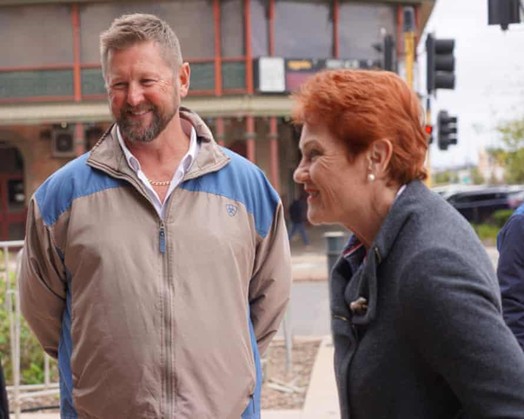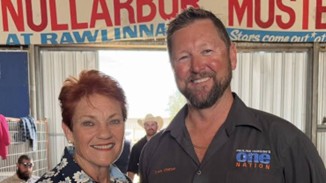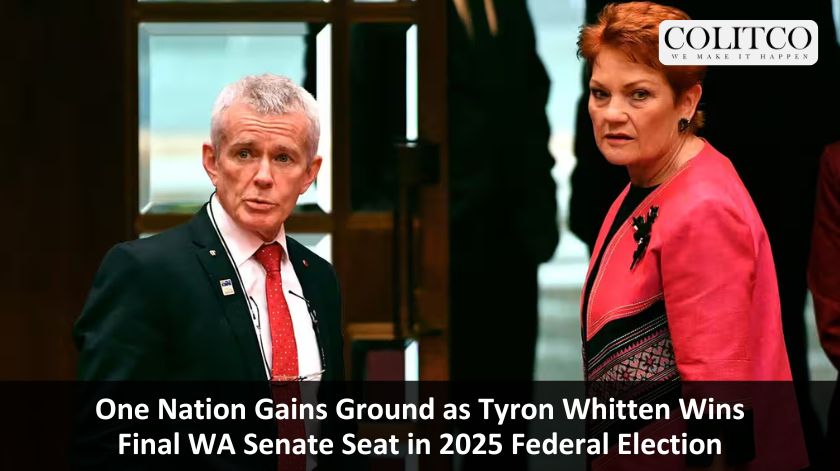In a notable twist during the 2025 Australian federal election, Pauline Hanson’s One Nation party clinched a decisive victory in Western Australia. Businessman Tyron Whitten emerged as the winner of the final WA Senate seat, marking a pivotal moment for the party’s growing influence in federal politics. The Australian Electoral Commission (AEC) confirmed Whitten’s win, solidifying One Nation’s position in the Senate as more than a fringe player.
Tyron Whitten’s Journey: From Business Tycoon to One Nation’s New Political Representative in WA

One Nation leader Pauline Hanson campaigning in Western Australia with Tyron Whitten. Photograph: Pauline Hanson/X
Tyron Whitten’s entry into federal politics was a bold leap from his entrepreneurial roots. As the co-founder of a major civil construction firm that employs over 1,000 Australians, Whitten brought with him a reputation for hands-on leadership and job creation. His success in WA reflects growing public interest in electing candidates with real-world, non-political experience—individuals perceived as closer to the people than traditional party operatives.
Whitten’s campaign message resonated with regional and small-business communities, especially voters disenchanted with the political mainstream. His presence in the Senate is expected to strengthen One Nation’s messaging around economic sovereignty, infrastructure investment, and regional development.
How Preference Deals and Vote Distribution Helped One Nation Win the WA Senate Battle
Whitten’s win was not solely a product of primary votes; rather, it was the outcome of a smart, behind-the-scenes electoral strategy. Australia’s preferential voting system played a critical role in his victory. Despite lagging behind major parties during the initial count, preference flows from other conservative and minor party voters lifted Whitten into the winning position.
The outcome highlighted One Nation’s growing mastery of preference negotiations—especially in tightly contested states like Western Australia. This echoes a similar strategy that worked in New South Wales, where Warwick Stacey won the final Senate seat for One Nation as well.
Four Senators and Growing: What One Nation’s Expanded Presence Means for the Australian Senate

With Tyron Whitten’s win, One Nation’s Senate representation now stands at four senators—Pauline Hanson, Malcolm Roberts, Warwick Stacey, and Whitten himself. This matches the Senate numbers held by the Nationals and marks the party’s strongest showing since 1998.
This development brings One Nation back to the heights it achieved after the 2016 double dissolution election and positions it as a key voice in Australia’s political dialogue. With additional seats, the party will likely intensify its advocacy on core issues, including immigration control, climate policy reversal, and economic nationalism.
Senate Power Dynamics Shift as Minor Parties Gain Leverage in Legislative Decisions
The Senate’s final composition post-election has led to a recalibrated power balance in Canberra. The Labor Party holds 28 seats, the Coalition 27, and the Greens maintain 11. The crossbench, featuring One Nation’s four senators, David Pocock, Lidia Thorpe, and Jacqui Lambie among others, now holds considerable sway.
With 39 votes required to pass legislation, Labor and the Greens have a razor-thin margin. If either party loses a member’s support, they will need to negotiate with crossbenchers like One Nation. This newfound leverage could position Pauline Hanson’s party as critical swing players, particularly on controversial or big-ticket legislation.
One Nation’s Policy Platform: Challenging Climate Commitments and Promoting National Sovereignty
Pauline Hanson has made it clear that One Nation will use its bolstered Senate presence to push back against globalist policies, particularly climate change agreements. In post-election commentary, she referred to climate change action as a “scam” that disadvantages Australians through higher costs and reduced freedoms.
Hanson has also reiterated One Nation’s commitment to stopping what it calls “excessive immigration,” promoting energy independence, and revamping education curriculums to reflect Australian values. With four Senate voices now echoing these policies, the party is expected to elevate national debates on these topics significantly.
Also Read: Best Performers in the ASX 200 Today: 30 May Market Movers
Labor’s Narrow Legislative Path and What It Means for One Nation’s Role in Shaping Bills
While Labor technically holds the upper hand with the Greens’ support, the numbers reveal a tightrope act. Any disruption in alignment, whether ideological or procedural, could open the door for crossbench negotiations. One Nation, with four reliable votes, could either support or block bills, depending on their alignment with party policy.
This not only gives Pauline Hanson greater bargaining power but also allows One Nation to draw attention to niche or underrepresented issues in Parliament. Topics such as regional job creation, small business tax breaks, and local manufacturing revival are likely to become focal points.
Public Reception: How the Australian Electorate Reacted to One Nation’s Senate Surge
The surprise results in WA and NSW indicate shifting voter sentiment, particularly in traditionally safe Labor regions. Many Australians, frustrated with slow reform, rising costs of living, and what they see as out-of-touch elites, are turning to parties like One Nation for a different kind of representation.
Analysts suggest that while One Nation remains a polarizing force, its message of “putting Australia first” is resonating more strongly in the current economic and political climate. Social media responses following Whitten’s win have ranged from celebration to criticism, underlining the deeply divided but passionate electorate One Nation appeals to.
Looking Ahead to the 2025–2028 Term: What to Expect from a More Powerful One Nation Bloc
With the 2025 election behind them, One Nation enters the new term with momentum and media attention. Tyron Whitten, the party’s newest senator, will likely focus on infrastructure development and industry-friendly legislation, while Pauline Hanson will continue to steer the party’s broader national agenda.
The 2025–2028 term will test One Nation’s ability to balance its populist rhetoric with the legislative responsibilities of a larger parliamentary presence. Whether they use this opportunity to form alliances or stir opposition remains to be seen—but one thing is certain: their voice will be louder, and their vote, more critical.












